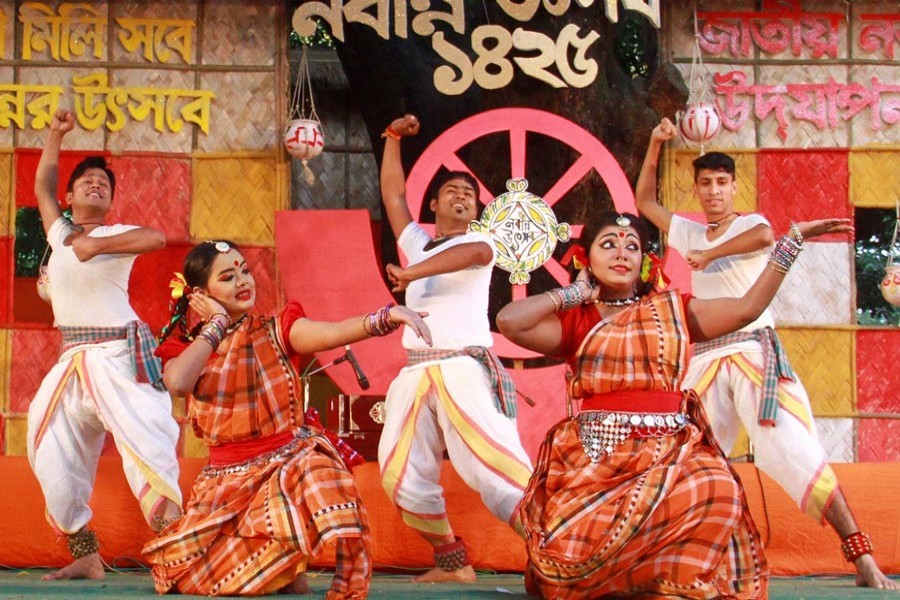
Published :
Updated :

With the mild bites of winter only a couple of weeks away, Dhaka's cultural activities have already started coming back to life. The winter-centred celebrations last year were subdued; and some organisations trimmed their programmes --- all due to the raging Covid-19 pandemic. With the intensity of the dreadful scourge coming down drastically, the scenario this year is quite different. In the capital Dhaka, the pageantry and fanfare round the Bengali harvesting event, Nobanno, heralded the season of winter festivals.
The harvest festival is considered the most widely observed one in the global annals of the tradition of community festivals. From northern Europe to Latin American indigenous communities, on the one hand, and from northern Africa, the Sahel, the Sub-Saharan and southern Africa to the sprawling Asia and the Far East to Australia on the other, the harvest festival has been the most widely observed.
The Indian sub-continent including Bangladesh, Nepal, Bhutan etc occupies a dominant place in the harvest celebrations. Coming to Bangladesh, the Nobanno festival has traditionally been one centred around paddy harvest in the rural areas. Around fifty years ago, with the Nobanno festival virtually being unknown to the land's big cities, the rural swathes would remain agog with myriad elements of the festivities. The most important segment of the merry event comprised food items, mostly sweet in taste and related to the newly harvested rice. Like seen in many traditional festivals, Nobanno would accompany varied types of cultural events. As time wore on and witnessed the fizzling out of many age-old cultural events like night-long 'jatra' and musical sessions, the post-harvest Bangladesh villages lie shorn of the traditional gaiety and the jovial air.
Thanks to a number of cultural platforms and activists, the city of Dhaka has long become a centre of revival of the lost or fast vanishing cultural events. These traditional fests infallibly stand for Bengalee culture. To the great woes of the nation, machinations have lately been promoted to convolute the country's time-tested heritage. According to many, persons out to taint and distort the Nobanno festival are, in reality, the later generations of those known villains. Those people tried to sabotage all cultural movements of the country, the chief one being the Nobo-borsho' or the Bangla New Year's celebration.
Their villainies, however, continue to fail on every occasion. The culturally aware urban youths deserve great plaudits for revival of the decaying village-based events at the urban venues, especially in Dhaka. Hadn't they put in their sincere efforts in bringing back the Nobanno and other village-based festivals, these traditions would long have vanished from the Bangladesh soil. On the other hand, educated young people in the vast rural Bangladesh, nowadays, remain busy with their smart-phone entertainments. They hardly bother about the cultural void created by the absence of the seasonal rural festivities. This reminds many people of the truth that despite the country's cultural ethos being rooted in villages, it was the city youths who helped its revival. Vast numbers of them are admirers of immortal folk poems and songs.
Appallingly, the rural youths remain glued to the Mumbai entertainment flicks. In the earlier times, the Dhaka youths organising Nobanno or Sheet (winter) festivals would be criticised for making fun of the villagers. This fad has changed. With the city-bred youths and cultural activists organising the rural festivals in greater numbers, the hostile attitude of the critics has undergone phases of change. In cases they become patrons of these youths. It helps them increase their following.
In accordance with the changing definition of urban life, the term no longer points to artificiality, or the much-defamatory dilettantism. Genuine urbanity represents the struggle for remaining attached to the roots in an ambience of pervasive sham.


 For all latest news, follow The Financial Express Google News channel.
For all latest news, follow The Financial Express Google News channel.